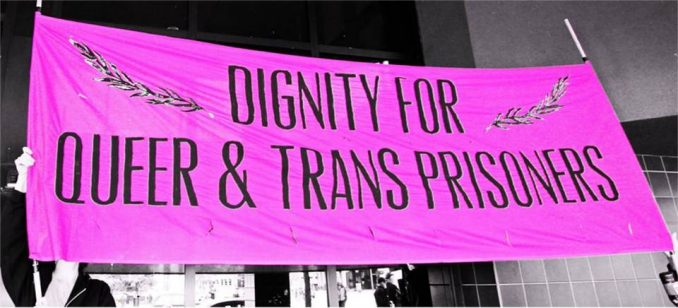‘Can’t cage our humanity,’ say LGBTQ prisoners
By Prison Abolition organizers
The second in a series of rallies in solidarity with queer and trans prisoners took place Oct. 12 in Lansing, Mich. The event outside the Michigan Department of Corrections headquarters aimed to educate the public and amplify prisoner voices by reading their statements aloud. Banners read “Can’t cage our humanity,” “Dignity for queer and trans prisoners,” “Freedom will blossom in the ashes of the prisons” and “Queer rage against prisons.”
The campaign stems from the struggle of gay and transgender prisoners at the G. Robert Cotton Correctional Facility in Jackson, Mich. They are routinely sexually harassed and demeaned by correctional officers.
Sexual harassment of prisoners is a violation of the federal Prison Rape Elimination Act. When some of the prisoners filed grievances against officers for the illegal behavior, they experienced further mistreatment and retaliation, with officers ganging up against them in coordinated efforts to retaliate against the grievances.
“We may be caged, but we’re not animals,” said a transgender inmate known as Chaz.
A first rally was held on May 26 to publicly support the prisoners. Yet the problems continue unabated, and no officers have been removed, punished or reprimanded. The Legislative Corrections Ombudsman’s office opened an investigation into the mistreatment, but has not communicated any findings to the public or to the prisoners.
The demands expressed by the prisoners largely ask MDOC to enforce its own employee policies. They include:
- Zero tolerance for harassment or brutality by prison staff
- No retaliation for filing grievances
- Guards who sexually harass prisoners should be removed from their units when they’re under investigation, per MDOC’s own policy. They should also be prohibited from forming cliques for purposes of retaliation.
- Staff should be required to follow MDOC’s own policies and federal policies that protect the rights of prisoners. Guards should be disciplined for violations, per MDOC policy.
- MDOC must provide better training for staff on professional, nondiscriminatory treatment of LGBTQ people.
- LGBTQ prisoners should have the voluntary option of a designated unit or facility and yard where they are safe from sexual harassment and assault.
- All prisoners should receive appropriate medical care.
- Transgender prisoners should be able to keep hormones in their quarters.
Protester Hannah Shaughnessy-Mogill said, “When a prison guard can harass prisoners in a homophobic or transphobic way and then retaliate against anyone who files a grievance, the system is built upon the denial of human rights.”
Prisoners inside the Cotton facility saw media coverage of the protest. The national LGBTQ prisoner support organization Black and Pink featured the rally in its newspaper, which reaches over 10,000 prisoners across the country. Black and Pink has been in the news for its “On the Inside Art Show” in New York City, demonstrating how queer and trans prisoners use art in their lives and struggles.
Recently one of the trans prisoners who filed grievances against correctional officers was physically assaulted by another prisoner. Although she was not at fault, when she was transferred to another facility, officers destroyed most of her property in what was believed to be another retaliatory act.
News of Chelsea Manning’s second suicide attempt came out in early November. Her attorneys said that the discipline she faced after her first attempt, including solitary confinement, further shattered her mental health. This is the “logic” of a system of incarceration that relentlessly assaults the humanity of all prisoners, and queer and trans prisoners especially. When queer and trans prisoners in Michigan stand up for their humanity, they are literally fighting for their lives.


